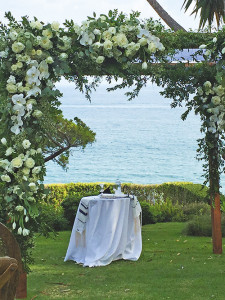
Note: All names have been changed to protect privacy.
The days of the bride’s family alone paying for the wedding are long gone. Today, both families often share the expense of bringing their children to the chuppah, but there are many ways of divvying up the tasks and the costs. The parents have to come to an understanding of what kind of event they want and how much they can spend. But there’s a caveat: The couple getting married may be perfectly matched, but when it comes to finances, their families may not be. Differences in income, philosophy, stage in life, even the number of children at home, all affect what each family can, and will agree to contribute. And the conversation between parents usually doesn’t start until after the boy pops the question and the girl says “yes.” As one mother told me, “It’s hard to meet someone for the first time and talk about the most awkward thing in the world.” Someone could make a fortune with a course on how to help families negotiate wedding costs.
When David’s oldest child got engaged last spring, he turned to a friend who had four married children to “de-mystify” the process of making a wedding and paying for it. The friend explained that the cost for each of his children’s weddings was divided differently according to the other family’s situation: one was a 50-50 split, the second was with a family with limited means so he chose to pay more, the third followed the FLOP formula (boy’s family pays for flowers, liquor, orchestra, photography) and the last was a custom variation. His advice to David: Be clear about what you will spend and be upfront about it to save arguing and recrimination later. As David learned, that’s easier said than done.

David and the other family agreed to split the cost of the wedding in half, but he didn’t know at the beginning what that really meant. There were also all the ancillary costs like the engagement party, the aufruf, Shabbos Sheva Brachos and clothing costs. “The numbers went up crazy fast,” he said. “It was a stretch.”
Matthew’s son dated his girlfriend for a while before they got engaged so he knew the girl well, but not her family. Initially the families agreed to split the majority of the wedding costs, and each pay for their own guests. Matthew and his wife kept their numbers low. Somehow, that fact reached the girl’s parents. “They said, ‘We want you to invite however many you want,’” Matthew recalled. “You do whatever is comfortable and we’ll cover the rest.” The chosson and kallah were very involved in choosing vendors. Matthew’s wife went with them to visit a few venues but the couple went to tastings, saw bands and reviewed photographer portfolios. As long as they were happy, he was happy. “It’s all about respect,” said Matthew. “Your kids are getting married. You might not see the machatunim all the time but you’re connected forever. At the end of the day, it’s about making your kids happy.”
There are some similarities and some differences with the wedding Carol is making next month and the one she made eight years ago. She felt the first time she was more aligned with her machatunim. For this wedding she said they are basically on the same page, splitting the expenses, but the families are at different stages. She still has several children at home and the groom’s family is older with no children at home and no more tuition bills. They are making decisions together but there have been hiccups. A florist she knew was in town one day and came to the house. The other mother was not happy that she wasn’t included. And although Carol loves flowers, she had to scale down her choices to keep costs in line. She focused on her priorities, which she notes are different for everyone. Carol has a big family and saw how each person had different ideas of what was important. One said she loves flowers and would “rather eat veggies” than skimp on the florist. Another called flowers “the black hole” of weddings. One didn’t care about music; they said it’s always too loud and annoying. But their daughter thought that was the most important part of the wedding and said the music makes the party.
Carol was shocked at how much prices have gone up since her last wedding. What cost a few hundred dollars then costs thousands now. And there are new trends she hadn’t heard of, like a “dresser” that follows the bride and tends to her needs all day. But what matters most to her now is being present at the wedding. “You can’t rely on pictures to capture the experience, you have to live it,” she said. She is reminding her husband that when he gives their daughter a bracha at the bedekin he should tune out the hundreds of people around him and take a minute to be fully present. “It’s a once in a lifetime experience. He shouldn’t worry about the guy next to him.”
Making a wedding for a couple living in Israel has extra challenges. Chaim and his wife communicated with their daughter and met their machatunim on Zoom. They had done some research on costs and came up with a rough figure of what they thought the wedding would cost and agreed to pay half. In the end, with the extra expenses they hadn’t anticipated, they spent what they thought the whole wedding would cost. They did ask the couple what their priorities were. Their daughter is a photographer, so photography was very important, flowers not so much. And their son in law wanted an open bar. “It’s important to pose that question to the bride and groom to work into your budget,” he said. Although they hired a wedding planner, Chaim said he underestimated how much of the work and stress would fall on his daughter, but in retrospect, he doesn’t know what more he could have done to help.
Sarah and Josh met in Washington Heights and dated for seven months before getting engaged in 2019. They planned a June 2020 wedding. It didn’t take long to realize that their families, both living in different states, didn’t agree on how to make the wedding. With a lot of back and forth, the couple started to make plans. They put a deposit down on a shul, still not sure how it would all work out. Sarah’s mother booked a flight to New York in March to help pick the flowers and the band. But as the saying goes, man plans, God laughs. New York shut down to contain the spread of Covid. By Pesach, things were still not opening up. Sarah and Josh thought about postponing the wedding but didn’t want to run into the Three Weeks in the summer, when weddings are not permitted by Jewish law, or interfere with another sibling getting married in the fall.
With the guidance of their rabbi, the mesader kedushin, Sarah and Josh kept the date, canceled the shul and pulled together a DIY wedding for 10 people in a park near their home. They paid for the minimal expenses themselves. They borrowed a chuppah from the RCA. Their photographer was a medical student who took photos for a hobby. Her fee was $500 which would be donated to an organization to help women have children. Friends brought candles, fake flowers and a long pink fabric runner for the concrete floor from the Dollar Store. Sarah and Josh bought an inexpensive lapel mike and tripod to Zoom the wedding on Sarah’s phone, a totally new concept at the time, since they didn’t want anyone, including their families, traveling to the wedding. A friend whose mother was a baker made a cake. The rabbi said they should wash so they bought two packs of challah rolls. They had their wedding clothes—Josh’s custom suit and Sarah’s dress—but the dress had to be completely remade; Sarah had lost 40 pounds since she first had it altered.
“I wish my family could have been there but I’m happy we got married and there was no drama,” said Sarah. “My dad said, ‘Get married, there will be more things to celebrate.’” Eight months ago, both families flew in for a beautiful Simchat Bat. Everyone enjoyed the celebration.
By Bracha Schwartz









